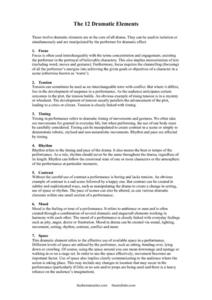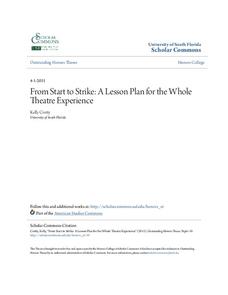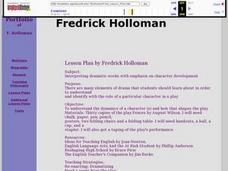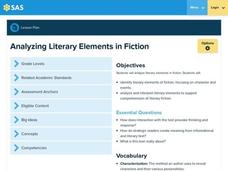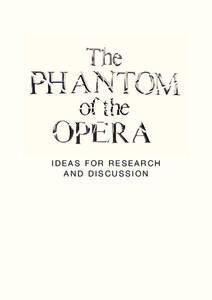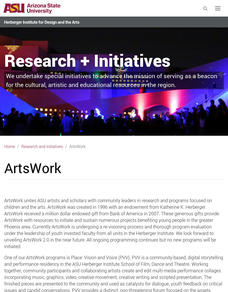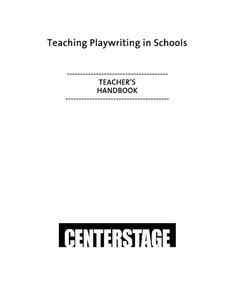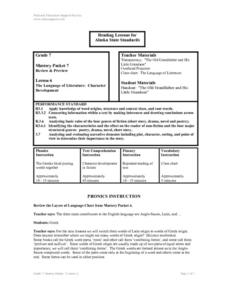York Catholic
Elements of Drama
Introduce young actors to the key elements of performance with this handout that defines key staging terms and activities.
David Elementary
Structural Elements of Drama
The world may indeed be a stage, and players certainly need to know drama vocabulary. This list of 16 terms (and their definitions) often found in scripts will prompt actors to perform their role.
Curated OER
Introduction to Drama
Introduce your class to drama! You cast each pupil as a different character from a story you have read. They are given a general outline of the scene, act out the scene multiple times, then discuss the weak and strong aspects of each...
Curated OER
Drama-Dialogue
Use drama to study and practice dialogue. Creative minds discuss what dialogue tells about a character, and how it can be used to advance the plot. They read a play, think about what they gleaned from dialogue, and record their...
Drama Teacher
The 12 Dramatic Elements
Plays are meant to be seen and so are these 12 elements that give plays the dramatic effect. Introduce young actors to these key terms and their explanations
Curated OER
Drama: Learn A Lesson from the Lion
Reading is reading, whether it's for drama or English class. Boost reading fluency, accuracy, intonation, and comprehension while fostering creative acting skills. Kids read the provided tale of "The Lion and the Mouse" several times in...
Syracuse City School District
Literary Elements
Address the literary elements in a piece of writing using these materials. The packet includes plenty of resources, and focuses mainly on theme, character, and point of view, with some materials for setting, symbolism, and author's...
Curated OER
Drama Genre Focus Lesson
Students examine the elements of drama to develop an appreciation and understanding of the genre. In this lesson students read, analyze, discuss, and review a dramatic selection.
Texas Education Agency (TEA)
Archetypes, Motifs, and Plot in Drama (English II Reading)
The second interactive in a series of 10 introduces young scholars to character archetypes, archetypal plot patterns, and archetypal motifs, including the use of color. Learners read passages explaining the term and study examples from...
Honors College at Scholar Commons
From Start to Strike: A Lesson Plan for the Whole Theatre Experience
Introduce young thespians to all aspects of the theater. A syllabus for a one-semester drama course provides lessons that take learners from the history of drama to the many facets of play production.
Curated OER
Interpreting Dramatic Works
Action! Delve into character development in the play Fences by August Wilson, setting the stage for learners to analyze character nuances. Thespians choose a scene from the script, responding with a written account of the...
Pennsylvania Department of Education
Analyzing Literary Elements in Fiction
Students analyze the characters and events in fictional writing. In this literary elements lesson plan, students study the meaning of the words characterization and fiction. They listen to the story Pigsty by Mark Teague, or any other...
Curated OER
Introducing Literary Elements in Fiction
Identify literary elements in fiction. In this reading comprehension lesson, learners read the book Pigsty and record literary elements onto a graphic organizer. They specifically discuss the main characters and events in the text.
Curated OER
Create a Playbill!
Seventh graders explore the various elements found in the advertisement of a dramatic experience. Playbills are created that reflect the plot without revealing the climax of the play. Costumes, set construction, and character description...
Curated OER
Drama Terms Notes
Comedy, tragedy, act, scene, prop. do you want to review important drama terms? Actors record the term next to its definition on a worksheet that could be used individually or as a group activity. A link to a corresponding PowerPoint...
Phantom of Opera
The Phantom of the Opera: Ideas for Research and Discussion
You could spend a full day discussing The Phantom of the Opera and not scratch the surface, but a set of lessons about the literary elements and themes of the musical production is a great start. Young thespians build upon the...
Curated OER
Analyzing the Use of Irony in a Short Story
Ninth graders examine how literature connects to real-life and see how irony aids in the development of theme. They read Shirley Jackson's The Lottery, and discuss elements of foreshadowing and situational irony. Then learners will write...
Curated OER
Lesson 2- Costume Design
Clothes might not make the man but they certainly do help an actor create a character. How costume designers employ the same elements of design found in sets (line, color, texture, shape) to realize a character is the focus of a lesson...
Curated OER
Creating Plays from Children's Stories
Pupils explain how individual elements (e.g., plot, theme, character, conflict, etc.) comprise the structure of a play. They write an original one-act play with developed characters, specific setting, conflict, and resolution.
Curated OER
Writing Drama-Trying Your Hand at being a Playwright
Fifth graders chart the elements of drama. In this performing arts lesson, 5th graders discuss the role of a playwrite, practice doing some Reader's Theatre scripts, write a paragraph about a problem between two people, and perform...
Learning to Give
Teaching Playwriting in Schools
The world is a stage, and so is your classroom! Hone the skills of the next generation of Tony® award winners with a set of exercises, reference pages, writing prompts, and excerpts from famous plays.
Pennsylvania Department of Education
Drawing Conclusions Based on Literary Elements
Students compare versions of Cinderella and draw conclusions based on the story elements identified. For this literacy comprehension and story elements lesson, students read several versions of Cinderella, complete a "Comparing Folklore"...
Curated OER
Greek Origins and Character Development
Seventh graders examine words of Greek origin and discuss character development in fiction. They read a list of Greek word parts and create words on a worksheet. Students then read and discuss an informational handout about character...
Curated OER
Understanding Stage Design: Using Visual Elements to Provide Information to an Audience
Students study about theatrical design by developing environments for improvised and scripted scenes. They develop focused ideas for an environment using visual elements.






